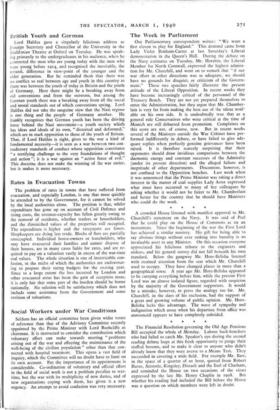British Youth and German
Lord Halifax gave a singularly felicitous address as Foreign Secretary and Chancellor of the University in the Sheldonian Theatre at Oxford on Tuesday. He was speak- ing primarily to the undergraduates in his audience, when he contrasted the men who are young today with the men who were young before 1914, and recognised the inevitable, the natural, difference in view-point of the younger and the older generation. But he reminded them that there was no conflict so real between age and youth in this country as there was between the youth of today in Britain and the youth of Germany. Here there might be a breaking away from old conventions and from the outworn, but among the German youth there was a breaking away from all the social and moral standards out of which conventions spring. Lord Halifax did not take the sanguine view that the Nazi regime is one thing and the people of Germany another. He frankly recognises that German youth has been the driving force behind the Nazi movement—a youth society whieh has ideas and ideals of its own, " distorted and deformed," which are in stark opposition to those of the youth of Britain. That, if Lord Halifax is right, gives to the war a kind of fundamental necessity—it is seen as a war between two con- tradictory standards of conduct whose opposition constitutes " a terrifying challenge to the very foundations of thought and action "; it is a war against an " active force of evil." This doctrine does not make the winning of the war easier, but it makes it more necessary.














































 Previous page
Previous page